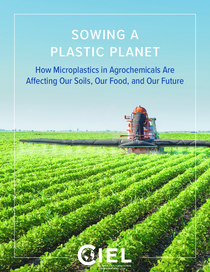Sowing a plastic planet: how microplastics in agrochemicals are affecting our soils, our food, and our future

Center for International Environmental Law, Washington DC
CIEL - Washington DC
2022
30 p.
plastics ; agricultural chemicals ; toxicity ; environmental impact assessment
Chemicals
English
Bibliogr.
"We are increasingly living on a plastic planet. Due to the explosion in plastic production and use, plastic pollution has grown exponentially in recent years. Tiny particles of plastic — or microplastic — are accumulating across the planet in even the most remote areas, in the air, in water, in soil, in plants, and in animals, including in our bodies. Humans are ingesting and breathing plastics and the toxins they contain through this continued environmental exposure.
One of the least known and most concerning sources of microplastic pollution is their deliberate addition to synthetic fertilizers and pesticides used in industrial agriculture. The application of plastic-coated agrochemicals to soils and crops directly introduces microplastic into the environment and potentially into the food supply. It also compounds the health and environmental hazards posed by agrochemicals themselves.
Synthetic fertilizers and pesticides, derived primarily from oil- and gas-based feedstocks, are already some of the most toxic substances in use today. Encapsulating them in microplastic, itself fossil fuel in another form, only heightens the risks. Because of its deliberate and controlled nature, microplastic pollution from plastic-coated agrochemicals is especially egregious, but it is also readily preventable. The only barriers are public awareness of the problem and political will to tackle it at its source by regulating the plastics industry.
Sowing a Plastic Planet: How Microplastics in Agrochemicals Are Affecting Our Soils, Our Food, and Our Future exposes the growing use of microplastics in agrochemical products, the industry's promotion of this practice, and its threats to human health and the environment. It concludes that, in the face of known risks and the significant probability that plastic-coated fertilizers and pesticides only add to existing harm from toxic chemicals and microplastic, their production and use should be banned."
Digital
The ETUI is co-funded by the European Union. Views and opinions expressed are however those of the author(s) only and do not necessarily reflect those of the European Union or the ETUI.